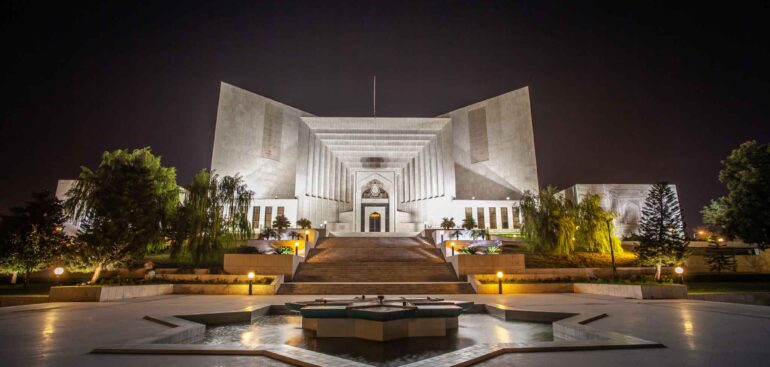Under the ominous shadow of death threats from Islamist extremists, the Supreme Court of Pakistan on Thursday (Aug. 22) reluctantly retracted part of a ruling that had recognized the religious freedom of an Ahmadi, a decision that will inevitably fuel further persecution of religious minorities, sources lamented.
The court’s capitulation to the demands of radical Islamists arose in an appeal by Mubarak Sani, a member of the Ahmadi Muslim community, which is reviled as sinful in the predominantly Muslim nation. Sani had been unjustly convicted under the Punjab Holy Quran Act of 2021, despite the incident in question occurring in 2019 before the law was even enacted.
In its initial ruling, the court had rightfully underscored that Article 20 of Pakistan’s Constitution guarantees every citizen the freedom to profess, practice, and propagate their religion, and determined that Sani had committed no crime by publishing religious literature. The Supreme Court then ordered his release on bail, a momentary triumph for justice and religious liberty.
However, this verdict, led by Chief Justice Qazi Faez Isa, provoked the wrath of Islamist factions, particularly the extremist Tehreek-e-Labbaik Pakistan (TLP), which unleashed a venomous campaign against Isa. Some TLP leaders even placed bounties as high as 10 million rupees ($35,790 USD) on the chief justice’s life, encouraging violence in the name of religion.
Amid fears of escalating violence, the Punjab provincial government filed a review petition under Article 188 of the constitution. Yet, on July 24, the Supreme Court resolutely stated that it had not strayed from the precedent set by the Federal Shariat Court and Supreme Court in granting Sani’s bail.
The decision to protect Sani’s rights sparked fury among Islamist hardliners. It ignited a stormy debate in the National Assembly’s Standing Committee on Law and Justice, where members from both the government and opposition benches disturbingly united in urging the federal government to challenge the Supreme Court’s ruling.
Amid mounting pressure and an atmosphere thick with fear, the Supreme Court of Pakistan found itself compelled to revisit its earlier decision, an unprecedented move in the nation’s judicial history. This came after the Punjab government, under intense political and religious pressure, filed a petition to remove certain sections from the court’s July 24 revised verdict. The federal government followed suit with a miscellaneous plea on Aug. 17, acting on directives from Prime Minister Shehbaz Sharif.
The Punjab government’s petition argued that prominent Islamic clerics and members of parliament had urged the federal government to approach the highest court, claiming that certain portions of the verdict were flawed and inconsistent with previous rulings. These religious leaders, wielding significant influence, insisted that parts of the judgment needed correction, casting a shadow over the integrity of the court’s original decision.
In a display of unprecedented coercion, the Supreme Court, buckling under threats and pressure, announced its readiness to review the verdict for a second time. On Tuesday (Aug. 20), hundreds of activists from extremist Islamic parties, including Tehreek-e-Labbaik Pakistan (TLP) and Jamiat Ulema-e-Islam-Fazl (JUI-F), brazenly breached security and stormed the Supreme Court building. In a chilling display, speakers at the rally openly threatened the judges, demanding the reversal of the verdict. They claimed the judgment had “deeply wounded the sentiments of the entire nation” and vowed to make any sacrifice necessary to protect the sanctity of Islam and the finality of the prophethood of Muhammad.
Under this duress, the three-member bench, led by Chief Justice Qazi Faez Isa and including Justices Irfan Saadat Khan and Naeem Akhtar Afghan, capitulated on Wednesday (Aug. 22), ordering the removal of paragraphs from the verdict, including those affirming freedom of religion. They decreed that the excised sections could no longer be cited as precedent in future judgments.
“I don’t want to say [it] but am helpless; I pray in every prayer that may God prevent me from making any wrong decisions,” Chief Justice Isa lamented during the hearing in Islamabad, his words reflecting the heavy burden of the threats and the bleak reality of the court’s surrender, as reported by the media.
Some veteran reporters present at the hearing described a tense atmosphere, noting that all three judges appeared visibly shaken and under immense pressure. The grim reality is well known in Pakistan: those who dare to defend individuals falsely accused of blasphemy often face lethal consequences, as evidenced by the tragic murders of a former governor and a high court judge for similar acts of courage.
